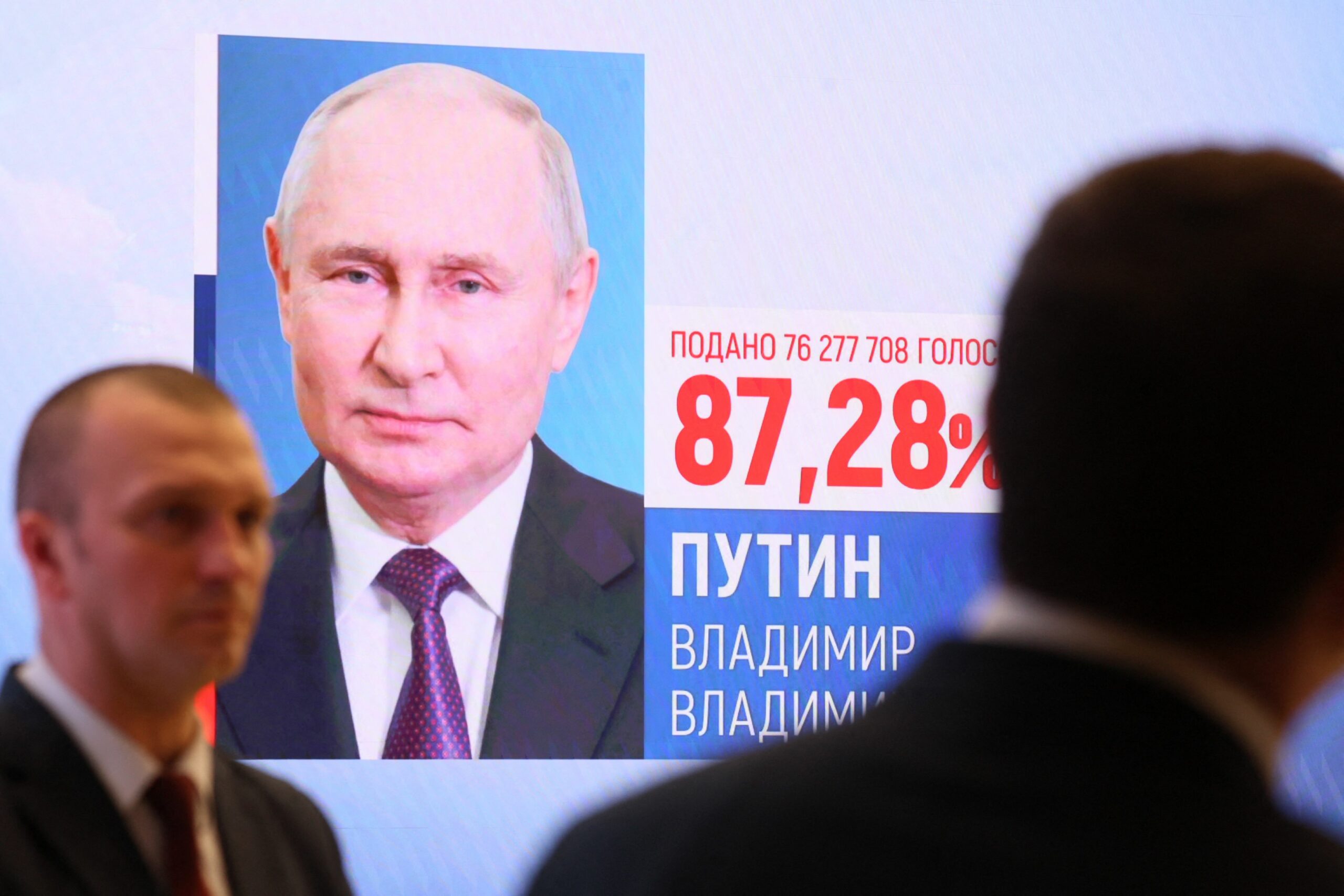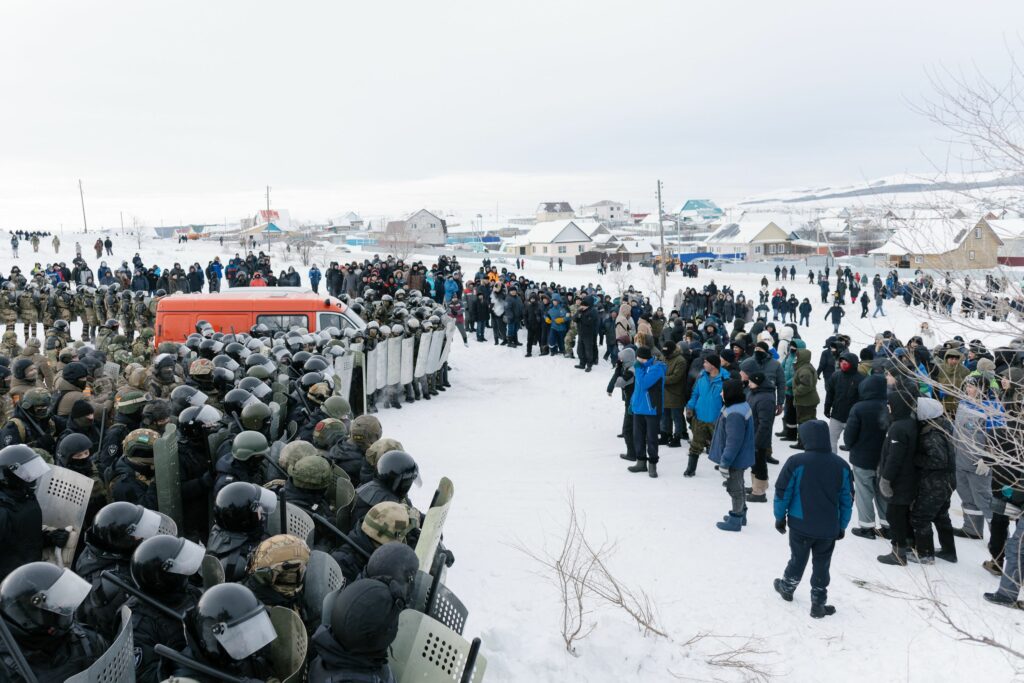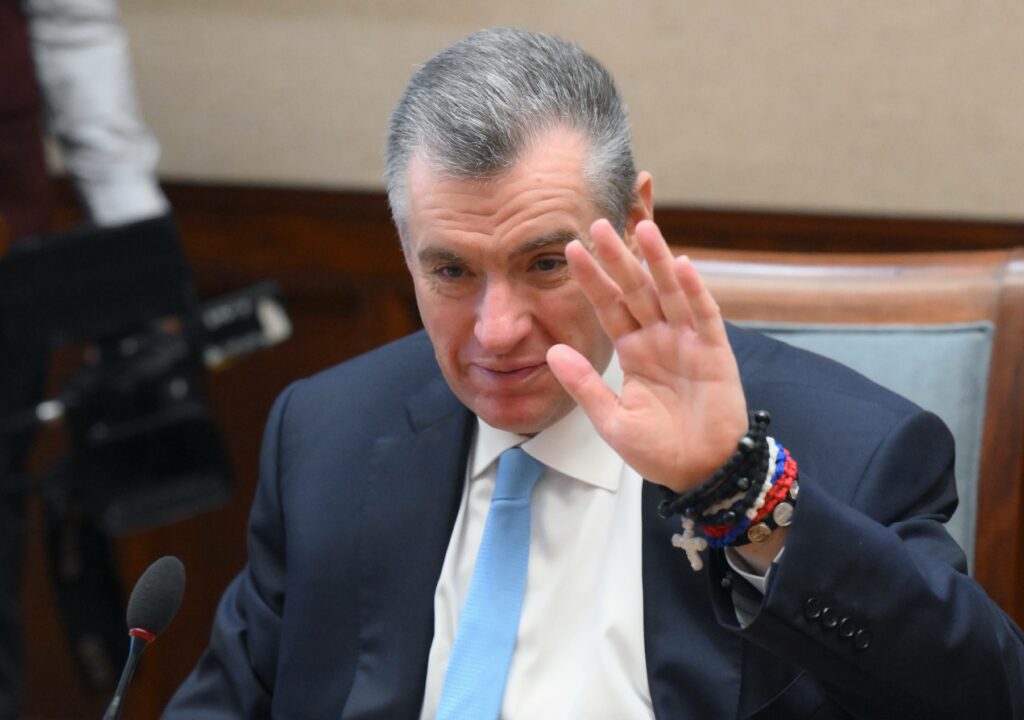Russia’s presidential election produced results more typical of Central Asian dictatorships than of a country that until recently was a member of the Council of Europe: 77.5% turnout and 87.3% votes cast for the incumbent president, who was elected for a third consecutive term (and fifth overall) after changing the constitution to allow it. Across the post-Soviet space as a whole, only the dictators of Azerbaijan, Kazakhstan, Tajikistan, Turkmenistan and Uzbekistan have scored higher. The analysis could end here: it is clear that such results have nothing to do with reality. However, it is important to understand how exactly they were obtained, because it will aid our ability to assess the true state of Russian society.
The most fraudulent elections in history
The very next day after the polls closed, the first estimates of the extent of fraud appeared. Then different experts, using different methodologies, came up with roughly the same results. Now these data seem to be confirmed by the still unfinished analysis of the results obtained in polling stations equipped with the ballot paper processing systems, i.e. where there was no manual counting of votes and the ballots were immediately scanned and counted by the machine (there might have been instances of ballot stuffing there as well, but in general the results at such pollings stations look more reliable or plausible).
The volume of «anomalous» votes on paper ballots alone (excluding remote e-voting) was about 22 million. «Anomalous» votes cast via the remote e-voting system accounted for about 8 million «anomalies» and another 4 million came from Russian-occupied Donetsk, Luhansk, parts of Zaporizhzhya and Kherson Oblast. It should be noted that on the eve of the vote we also predicted approximately this volume of falsifications.
The scale of the falsifications has so far been unprecedented at the federal level in Russia. The only election that has so far surpassed this one in terms of fraud is the 2020 constitutional referendum, which incidentally gave Putin the opportunity to run for president again. This volume of «anomalous» votes was then, as now, made possible by the almost complete lack of control over the voting and counting process at the polling stations. Not only did the candidates and the political parties that nominated them not recruit any significant number of observers and watchdogs (the Communist party, for example, offered its observers a rather uninspiring payment of 1,000 rubles (10 euro) for almost 40 hours of work on election days), but they did not even delegate there any civil activists who were willing to work for free. The only people present at the polling stations (besides members of the electoral committees) were the observers from Putin’s office and the local Public Chambers, who were given special instructions: to advertize ad popularize «the best elections ever» and to help the police handle the «provocateurs» at midday on Sunday: i.e. those who participated in the opposition’s «noon against Putin» protest action scheduled to take place at noon at the polling stations.
The real results and how they were obtained
As a result, the extent of falsification was so great that it is very difficult to establish the real results: this time around the number of the precinct electoral commissions on which data can be based is far too small. So far it seems that the real result in terms of turnout should be in the 55−60 per cent range (with people largely coerced to cast their votes), while Putin’s result should be around 80%. Vladislav Davankov should have gotten 10−15% of the vote and come in a solid second.
To be sure, eighty per cent in favour of Putin is also a lot. But 80% with a turnout of 55−60% and 87% with a turnout of almost 80% make for two very different societies. The former is the ordinary depoliticised society under electoral authoritarianism. The second is a «nation under arms» to use the title of Nicholas Stargardt’s book about Nazi Germany, a nation mobilized under a totalitarian regime. And it is important to understand both this difference, and the way in which these high percentages were achieved.
The current campaign is unique for a presidential election in that it has been «trimmed down.» As a result, we have the smallest number of competitors running against to the incumbent president in history, and those that were allowed to run were the weakest ever. Vladislav Davankov who came second had been virtually unknown before his nomination, Nikolai Kharitonov was an obsolete candidate 20 years ago, the last time he ran for president, and many people still mistake Leonid Slutsky for his absolute namesake, a football coach. None of the candidates conducted a proper campaign, and the media gave the election virtually no coverage. For the first time in Russia’s post-Soviet history, none of the «pro-Western» or «liberal» candidates were inculded into the ballot paper. The presidential administration was even too scared to risk allowing Boris Nadezhdin to run - a politician who had been part of the system and little known at the start of the campaign. In addition, one should mention unprecedented pressure on voters, including attempts by «law enforcement» officials to control the very act of voting right at the polling stations: never before have there been so many scandals involving the forced, violent violation of the secrecy of the ballot.
Roughly speaking, these abuses are more typical of gubernatorial elections in the region, which tend to produce roughly the same results (only the turnout is lower). In the autumn gubernatorial elections in 2023, a large number of Kremlin-backed candidates also received around 75−80% of the vote in the absence of any competition. However, there was one region where political competition was in fact real: Khakassia. In Khakassia, the «United Russia» party candidate withdrew just a few days before voting began, and the Communist governor won. This withdrawal was even more striking than the obvious defeat.
In assessing the current outcome of the presidential election, it is worth remembering this precedent. Throughout his time in power, Putin has never taken part in a competitive election campaign. He has not even taken part in a single presidential debate: Kremlin obviously fears any open and fair competition on a level playing field.
Regional peculiarities
The last presidential elections were so rigged that it is almost impossible to speak of serious regional differences. If before there were about 20 regions that were called «electoral sultanates» — in Russian political jargon, the term is typically applied to regions where the most blatant frauds are practiced without any concern for plausibility, with turnouts and the scores attributed to the ruling candidates systematically exceed 80% and higher, such as Dagestan, Chechnya, Tatarstan, Tyva, etc. Now almost all of the regions, including Moscow, have turned into such «sultanates» ready to produce desired electoral results. However, it is not certain that this distribution will be maintained in the regional elections, since it has been achieved in the absence of control on the part of independent watchdogs and in the absence of any resistance. Nevertheless, some peculiarities are already visible. The most significant is the turnout in the regions. If we look at the five regions with the lowest turnout, we find no surprises here: these are the regions that have traditionally been problematic for the authorities: Komi (58.6%), Altai (59.6%), Tomsk (60.1%), Karelia (60.2%) and Udmurtia (62.6%). These are followed by the cluster of a relatively «honest» regions in Siberia, the Urals and the northern European part of the country. If we look at the regions where Putin won the lowest share of votes, the picture is much the same: the worst results were shown by the regions of the North-West (Karelia, Vologda, Arkhangelsk Oblast), but even there Putin won close to 80% of the votes.
It seems that we should be talking less about regional differences and more about the gap between the results of big cities, small towns and villages. In this sense, Russia is no different from any other country in the world. The concentration of the protest in the northern and eastern regions is probably due to the fact that, under harsh natural conditions, the population is concentrated in the cities, while central Russia still has a large rural, more conservative population.
The list of the major «electoral sultanates» is quite predictable as well. The leading three have a long history of thoroughly rigging election results: Chechnya, Kuzbass and Tyva. They are followed by the so-called «new regions», Ukrainian territories occupied by Russia, as well as Kabardino-Balkaria and Kuban.
Conflict of society and the regime
As a result, we are seeing the continuation of a trend that began many years ago but was interrupted twice by the wars with Ukraine: society and the authorities are drifting further and further apart. In fact, the Kremlin is actively using the production of external crises and emergencies to freeze this divergence, this growing schism, at least for a while. Society continues to live in the paradigm of an authoritarian depoliticised state, which it is increasingly fed up with, while the state itself is slipping more and more towards mobilizational totalitarianism, with large-scale repression, torture of prisoners, increased hysteria in propaganda channels and the corresponding official election results.
Why can we say with confidence that society is tired of what is happening? In recent months we have seen many manifestations of this fatigue: an attempted armed uprising, local protests in Bashkortostan and other regions, the movement of wives and mothers of those who have been mobilised demanding rotation and the release of their husbands from the front, the queues in support of Boris Nadezhdin’s registration as a presidential candidate, and the mass attendance at Alexei Navalny’s funeral. These actions of indignation involve different strata and groups of society, including those that used to be part of the super-loyal foundation of the regime.
In this sense, it is worth taking a closer look at the actions that took place on voting days. And this is not so much about the «noon against Putin» as about the attempts to set fire and deface ballot papers with ink or other coloring substances. The «law enforcers» and members of election commissions were quick to say that the detainees confessed that they had been victims of evil con-artists that had allegedly tricked them into defacing voting ballots. But can we really trust any statements coming from the «law enforcers» in modern Russia? We have seen that these actions were undertaken by very different people, including a professor of one of the country’s largest universities.
It should be noted that the first similar actions were first recorded way before 2024: during the vote to change the Russian Constitution in 2020. At that time, criminal cases were opened following attempts to set fire to a polling station and attacks on members of the election commission. The court archives hold verdicts on these cases, which include testimonies from the perpetrators themselves.
In one such case, on 27 June 2020, two drunk residents of Kurgan attacked members of the election commission. They said that the voting process taking place in the yard of the house was illegal and demanded that the members of the election commission stop it. According to the case documents, the attackers pushed the members of the electoral commission, knocked them down and tied their hands behind their backs. They also damaged the ballot box used outside the polling station.
In the second case, on 28 June 2020, an intoxicated resident of the Leningrad region tried to set fire to the premises of the polling station election commission No. 139 in the village of Enkolovo, Vsevolozhsk district (not one voting booth, but the entire premises) with a Molotov cocktail. His attempt was unsuccessful, the premises did not catch fire, while the unlucky arsonist was spotted by a police officer and detained.
In both cases, the perpatrators stated that they wanted to protest the introduction of constitutional amendments and interrupt the voting process. They could not find any viable way to influence the situation and their feeling of powerlessness translated into such actions. At that time, however, the courts and «law enforcers» showed mercy to the accused and they got off with fines.
Thiis time, however, the reaction of «law enforcers» and election commissions was markedly different. For example, one of more recent accidents of this kind is now being re-framed by the «law enforcers» as a terrorist attack. When commenting on such cases that took place in the days of voting, the head of the Russian Central Election Commission, said: «This is being done by the same bunch of scumbags who blow up railway tracks for 10,000 rubles, who blow up people, it’s the same bunch of scumbags who are ready to sell anything for a bloody penny». In fact, the state authorities have equated the use of coloring liquid to ruin ballot papers with the the Crocus City Hall attack.
And this, too, is an indicator of the authorities’ growing hysteria and the escalating conflict between the state and the disgruntled sections of society.
But to really be able assess what is happening, it is worth waiting for the regional elections in September: to see the level of real competition and the level of people’s discontent, which is better seen in regional and local elections. This, by the way, is exactly what happened in 2018, when the Kremlin ran into completely unexpected problems at the regional level, six months after its triumphant presidential election.









